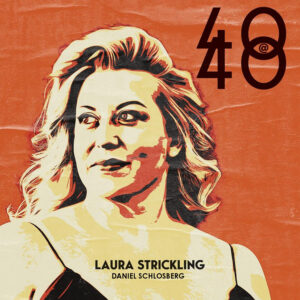Laura Strickling
40@40
Laura Strickling, soprano, Daniel Schlosberg, piano
Bright Shiny Things
Soprano Laura Strickling was nominated for a Grammy in 2022 for her last CD, Confessions, and has followed this up with forty art song commissions to celebrate her fortieth birthday: the 40@40 project. The eponymous recording features the first twenty of the commissions, with a second volume to follow.
40@40 is already gaining considerable, well-deserved notice. Upon its release, it landed on the top of the Traditional Classical category on the Billboard Charts. Art song doesn’t often garner such a distinction, and Strickling’s advocacy for the genre is laudable. She is a talented vocalist with a wide range, warm in her low register and powerful in an impressive upper register. Moreover, her interpretive gifts are considerable. This is certainly true of collaborative pianist Daniel Schlosberg, who also has chops to spare for the most challenging passages of the songs. He pairs beautifully with Stickling. The twenty composers featured on the recording include some of the leading lights of American song, as well as fine composers who may have thus far flown under the radar of critical acclaim, but more than hold their own with the heavyweights.
“Wind Carry Me,” by James Primosch is a setting of Susan Stewart’s poetry. Primosch was an expert crafter of art songs and the poem clearly resonated with him. The song is given a poignant and assured reading by Strickling, with clarion climaxes and operatic declamation. Tom Cipullo’s setting of “At Spring’s End,” by Ezra Pound, has a wistful piano prelude and long, sinuous legato vocal lines with quick, sometimes surprising, harmonic changes. “Let Us Remember Spring ” by Andrea Clearfield, presents Charlotte Mew’s poem with a slow build that eventually arrives at the top of Strickling’s range with an exultant demeanor.
Myron Silberstein set’s Karen Poppy’s poem “Prometheus’ Monster” with a pleasing, light touch, providing Schlosberg with a fleet-fingered piano part and Strickling with long lines juxtaposed against it. The piano slows, moving into the same lyrical demeanor as the singer, in a coda that is given one spicy dissonance at its conclusion to remind us of the opening. Lori Laitman sets Caitlin Vincent’s “Thanks a Latte” in an arioso that adroitly moves through various sections and tempos that respond to the poem with skilful text-painting. Laitman gives Strickling ample opportunity to explore drama and humor. The soprano has fun with the song, providing a welcome diversion from the moodier pieces. Likewise, Julian Hall supplies “Two Old Crows,” a poem by Vachel Lindsay, with a puckish accompaniment and playful melismatic vocal lines. It culminates with energetic, humorous singing, the piano playing a quote from “Flight of the Bumblebee.”
Daron Hagen’s setting of Christina Ramirez’s “Benediction” is flat out gorgeous. Hagen is not only sensitive to word-setting and poetic form, he also shapes art songs to have a design that is elegant, crafting melodies that both paint local words and are part of a larger framework. The recording closes with “Song of Solitude (Alone),” a poem by Nikos Valance, is given a sumptuous setting by H. Leslie Adams, unspooling memorable melody after memorable melody.
Laura Strickling is one of the best advocates for art song performing today. One eagerly awaits the next installment of 40@40 and, with fingers crossed, a songbook containing all forty. Recommended.
-Christian Carey

